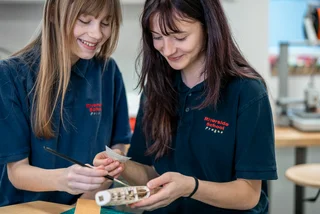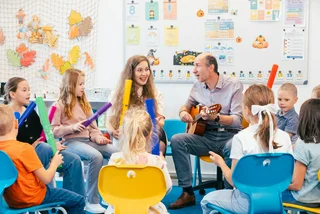Written by Sue Legro
for Expats.cz
Whether you are new to parenting or just new to Prague, a playgroup can be great for your children…and for you. I called on a few “experts” — mothers who have run playgroups or participated in more than one playgroup — for advice on starting, running, or just enjoying a playgroup in Prague. Here are some of their thoughts.
PARTNER ARTICLE
Why a playgroup?
While infants and toddlers don’t really play together in an organized way, an Italian mother of 4 points out that playgroups can provide children with regular contact with other children, their first interactions, and even their first friendships. An American mother of 3 notes that for toddlers approaching preschool age, a structured group can support school readiness. Playgroups are also a valuable opportunity to find other English-speaking children for small members who speak another language (or languages!) at home.
For parents, there is the joy of knowing that at least once a week someone else will make you a strong cup of coffee. Seriously, though: as an English mother of 2 noted, the support of a group of new mothers was “priceless,” and her playgroup got people out of their houses. Several of the mothers interviewed mentioned that the groups were valuable for meeting other mothers, finding out about children’s activities and supplies in Prague, and picking up ideas about toys, food, and songs and games.
How to Find a Playgroup
Prague playgroups are like Prague tourists — they’re around at any given time, but they come and go. The discussion forum in the family section of Expats.cz is a good place to start your search. IWAP (www.volny.cz/iwap) also lists playgroups for members in its monthly magazine. The number of its these groups has fluctuated between one and five over the past several years, and groups may be full, but their South Prague group has been running for more than five years.
School-based playgroups may be an option, depending on the administration and the level of parent enthusiasm. For example, BISP (www.bisp.cz) has offered a complimentary parent’s corner for younger siblings of students through its Acorns nursery, and EISP (www.eisp.cz) has periodically offered an afternoon weekly playgroup at its Greenhouse campus for children aged 6-18 months for a fee. Call or write schools to inquire.
Mom’s Club (www.momsclub.org), an international organization that runs literally thousands of playgroups through its chapters, is not currently active in Prague. However, a previous member started a website for Prague, and their headquarters welcomes volunteers interested in starting a Prague chapter. Finally, if you are interested in finding a Czech-speaking playgroup and meeting some of your neighbors and their kids, take a look at the Mothers Centers (www.materskacentra.cz) website to find a club near you–there are centers in every Prague district and all over the country. If you have twins or multiples, the Twins and Multiples Club (www.dvojcata.cz) has a Czech playgroup along with the other resources it offers.
How to Start a Playgroup
The lifespan of a Prague playgroup is often about the same as a can of fazolky:.. 2-3 years. Unfortunately, this means that you may not find a good playgroup match in Prague, especially if you have a new baby. Fortunately, starting a group is not hard.
First, you can find potential members by posting on Expats.cz, local listserves, or putting up a notice at schools. As the Italian mother of 4 notes, going through a pre-existing institution can help you to reach a big group of parents quickly. Word-of-mouth is also helpful. The English mother of 2 started her group with mothers she met in her prenatal class. I started a group with someone I met at a prenatal swimming class and someone I met at the maternity hospital; we found other mothers through IWAP and word-of-mouth. When you have a core group of 3-5 parents, you can get together and agree on a format for your group.
Planning Your Group: Things to Consider
Goals: No, you don’t have to write a mission statement — it’s just a playgroup! However, it’s important to agree up front about what you expect. Some groups are very structured and child-focused, others emphasize support for new mothers, some meet at home, and…well, you get the picture.
Where to Meet: Most Prague playgroups meet at member’s homes on a rotating basis. Mothers in these groups like having a child-proofed, personal meeting place with lots of toys that is not dependent on good weather. The American mother of 3 attended a group that met in the same house each week — if you have a generous volunteer with the necessary space, this option can be good for toddlers who like having familiar surroundings.
Out-of-home options include rented rooms in a community center or gym. This is a good all-weather option, particularly when you have a horde of hyper toddlers. However, one parent then has to collect fees from the other members, which is possibly the only job in Prague worse than being the washroom attendant at Hlavní nádraží. Groups meeting in a public play area don’t have to worry about fees, but it can be hard to focus on the group when there are lots of other children around, groups seem to have lower turn-out, and the coffee is rarely as good.
When to Meet: “Regularly,” says the English mother of 2. Absolutely — having a fixed day and time really does seem to help attendance, as members get used to scheduling the group as they would any other activity for their family. Weekday mornings work well for many parents, particularly because older siblings are in school. Weekday afternoons can also work if your youngest participants have the same napping habits. Weekends are challenging: you’ll find yourself competing with a formidable line-up of family commitments, cottages, travel, and out-of-town visitors. Some groups meet year-round, while others take a break in the summer.
Group Size: You don’t need a big group to be successful. In fact, the English mother of 2 suggests, “Keep it small.” A small group can meet comfortably in members’ homes, and you will thank yourself when the kids start toddling and the noise level skyrockets. That said, almost half of your group is likely to be out sick during the cold/flu season, and it’s a rare day when every single member shows up. Your official head count probably won’t be the same as the number of toddlers who appear each week.
Age Range: All of the mothers interviewed agreed that playgroups work best when the children are around the same age. This is true both for the children (a toddler/baby mix can be tough to manage), but also for parents — certain parenting topics like diaper rash and potty-training are fairly age-specific.
Format: How much structure do you want to have? For 2- or 3-year-olds, some playgroups have included crafts, songs, and stories. Other groups stick to free play, while some offer a hybrid: toy time with a round of songs at the end, one led by each adult. Some groups have a healthy snack, while others are more choco-centric.
Organization: Who will organize your group? Most of the mothers I interviewed felt that a single organizer seemed to work best. The organizer can ask for volunteers and set up dates one month at a time. Some groups ask members to RSVP, others don’t.
Activities: A playgroup can be a good base for organizing other activities. Our group scheduled annual trips to the zoo, an Easter egg hunt, a visit to a farm, occasional mom’s nights out, and some guest speakers (one on breastfeeding from LaLeche League and one on infant/toddler first aid and CPR). In each case, one of our members took the initiative to organize the event.
Final words of advice? As the English mother of 2 says, if you are thinking about joining a group, “Definitely do it!”
— Sue Legro is an environmental consultant; she and her husband are raising two young children in Prague












 Reading time: 6 minutes
Reading time: 6 minutes 


















